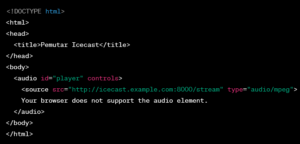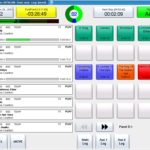
Dalam tulisan kali ini saya akan sedikit mengulas aplikasi GlassCOder – Audio Encoder yang minimalis dan saat ini hanya berjalan di OS Linux. Untuk rekan rekan yang suka ngoprek linux, bisa mencobanya.
Aplikasi ini sudah support beberapa format Audio :
MPEG-1/1.5 Layer 2 (‘MP2’), MPEG-1/1.5 Layer 3 (‘MP3’), MPEG-4 Advanced Audio Coding, High Efficiency Profile (‘HE-AAC+’), Ogg Opus, Ogg Vorbis
Untuk saat ini GlassCoder belum memiliki interface GUI, semua masih berbasisi command line, namun bagi yang suka ngoprek dan coding, bisa membuat script sendiri untuk ngontrol aplikasi nya. Aplikasi ini bisa mengirimkan audio ke Icecast, Shoutcast atau post dalam bentuk format HTTP Live Streams [HLS].
Berikut saya sertakan OPTION yang ada dalam DOC GlassCoder
DEVICE OPTIONS
Advanced Linux Sound Architecture (--audio-device=ALSA)
--alsa-device=dev
The name of the ALSA device to use. If no --audio-device option is given, then the
hw:0 device will be used.
Direct File Streaming (--audio-device=FILE)
--file-name=name
The name of the file to stream. If no --file-name option is given, then the name
of the file will be read from standard input.
The Jack Audio Connection Kit (--audio-device=JACK)
--jack-client-name=name
The name of the JACK client to use. Default is glasscoder.
--jack-gain=gain
Apply a fixed gain of gain dB before encoding. Default is 0 dB.
--jack-server-name=name
The name of the JACK server instance to use.
SUPPORTED URL SCHEMES
Not all URL schemes are supported by all server types. The following chart breaks down the
options.
Table 1. Supported URL Schemes by Server Type
┌──────────────┬───────────┬───────────┬──────────┐
│ Server Type │ FILE:// │ HTTP:// │ SFTP:// │
├──────────────┼───────────┼───────────┼──────────┤
│FILE │ Yes │ No │ No │
├──────────────┼───────────┼───────────┼──────────┤
│FILEARCHIVE │ Yes │ No │ No │
├──────────────┼───────────┼───────────┼──────────┤
│HLS │ Yes │ Yes [1] │ Yes [3] │
├──────────────┼───────────┼───────────┼──────────┤
│IceCast2 │ No │ Yes [2] │ No │
├──────────────┼───────────┼───────────┼──────────┤
│IceOut │ No │ Yes │ No │
├──────────────┼───────────┼───────────┼──────────┤
│IceStreamer │ No │ Yes │ No │
├──────────────┼───────────┼───────────┼──────────┤
│Shout1 │ No │ Yes [2] │ No │
├──────────────┼───────────┼───────────┼──────────┤
│Shout2 │ No │ Yes [2] │ No │
├──────────────┴───────────┴───────────┴──────────┤
│[1] Utilizes the HTTP PUT and DELETE methods │
├─────────────────────────────────────────────────┤
│[2] Utilizes the HTTP GET method │
├─────────────────────────────────────────────────┤
│[3] Supports ssh(1) password authentication only │
└─────────────────────────────────────────────────┘
METADATA
GlassCoder supports the notion of two types of metadata: "channel-based" metadata, which
applies to the stream as a whole and does not change for the duration of an encoding
session; and "timed" metadata, which can be changed in synchronization with the content of
the audio stream. Channel-based metadata can be specified by means of options given to
glasscoder(1) and will be covered in detail in the sections devoted to specific server
types (below).
The primary mechanism for supplying timed metadata in GlassCoder is by means of a JSON
document containing the desired metadata, sent to the target glasscoder(1) instance at the
port specified by the --metadata-port option by means of an HTTP POST operation. The basic
format of the JSON document is as follows:
{
"Metadata": {
"Field1": "Some value",
"Field2": "Some other value"
}
}
Not all server types support metadata, and those that do utilize wildly different schemas.
Following is a breakdown of the available metadata options by server type:
IceCast2
Channel Metadata
IceCast2 supports the following channel metadata fields:
Name
Specified by the --stream-name option.
Description
Specified by the --stream-description option.
URL
Should be a link to content related to the stream. Specified by the --stream-url
option.
Genre
Should be a single word describing the nature of the stream content. Specified by
the --stream-genre option.
Timed Metadata
IceCast2 provides one field of text, called StreamTitle, which can be dynamically
updated to reflect the content currently playing on the stream. By convention, this is
usually formatted as 'Artist - Title' on streams containing musical content.
For example, to set the StreamTitle field to The Beatles - Hey Jude, the following
JSON could be used:
{
"Metadata": {
"StreamTitle": "The Beatles - Hey Jude"
}
}
Legacy Interface
In addition to the primary JSON interface, the StreamTitle can be set by sending an
HTTP GET request to a running glasscoder(1) instance, using the TCP port specified in
the --metadata-port=port option. The request must be in the following format:
http://hostname:tcp-port/admin/metadata?mount=mount-point&mode=updinfo&song=string
Where:
hostname - The hostname or IP address of the system running glasscoder(1)
tcp-port - The TCP port number specified in the --metadata-port option to
glasscoder(1)
mount-point - The mountpoint of the stream
string - The string to set, encoded as specified in Section 2 of RFC3986
For example, to set a string of "The Beatles - Hey Jude" via a glasscoder(1) instance
running at encoder.example.com with a --metadata-port value of 1234 for a mountpoint
of MyStream, the URL would be:
http://encoder.example.com:1234/admin/metadata?mount=MyStream&mode=updinfo&song=The%20Beatles%20-%20Hey%20Jude
ShoutCast
Channel Metadata
ShoutCast supports the following channel metadata fields:
Name
Specified by the --stream-name option.
URL
Should be a link to content related to the stream. Specified by the --stream-url
option.
Genre
Should be a single word describing the nature of the stream content. Specified by
the --stream-genre option.
ICQ ID
Should be User Identification Number for an ICQ user associated with the stream
content. Specified by the --stream-icq option.
AOL Instant Messenger ID
Should be an ID for an AOL Instant Messenger user associated with the stream
content. Specified by the --stream-aim option.
IRC ID
Should be an ID for an Internet Relay Chat channel associated with the stream
content. Specified by the --stream-irc option.
Timed Metadata
ShoutCast provides two fields of text which can be dynamically updated to reflect the
content currently playing on the stream, called StreamTitle and StreamUrl. By
convention, the StreamTitle is usually formatted as 'Artist - Title' on streams
containing musical content, while StreamUrl is used to provide a URL whence stream
specific content --e.g. album cover art -- can be retrieved.
For example, to set the StreamTitle field to The Beatles - Hey Jude and the StreamUrl
field to http://images.example.com/1234.png, the following JSON could be used:
{
"Metadata": {
"StreamTitle": "The Beatles - Hey Jude",
"StreamUrl": "http://images.example.com/1234.png"
}
}
Note
The use of either of these fields is optional in any given metadata update. If
only one field is given, the other will remain unchanged.
Legacy Interface
In addition to the primary JSON interface, the StreamTitle and StreamUrl fields can be
set by sending an HTTP GET request to a running glasscoder(1) instance, using the TCP
port specified in the --metadata-port=port option. The request must be in the
following format:
http://hostname:tcp-port/admin.cgi?pass=password&mode=updinfo&song=stream-title&url=stream-url
Where:
hostname - The hostname or IP address of the system running glasscoder(1)
tcp-port - The TCP port number specified in the --metadata-port option to
glasscoder(1)
password - The ShoutCast password, encoded as specified in Section 2 of RFC3986
stream-title - The string to set for StreamTitle, encoded as specified in Section 2 of
RFC3986
stream-url - The string to set for StreamUrl, encoded as specified in Section 2 of
RFC3986
For example, to set a StreamTitle of "The Beatles - Hey Jude" and a StreamUrl of
"http://image.example.com/1234.png" with a password of "MyPassword" via a
glasscoder(1) instance running at encoder.example.com with a --metadata-port value of
1234, the URL would be:
http://encoder.example.com:1234/admin.cgi?pass=MyPassword&mode=updinfo&song=The%20Beatles%20-%20Hey%20Jude&url=http://image.example.com/1234.png
HTTP Live Streams (HLS)
Timed Metadata
HLS supports timed metadata in the form of embedded ID3v2.4 tags. Available fields
thus include the entire set of text tags defined in the ID3v2.4 frame specification
(available at http://id3.org/id3v2.4.0-frames).
For example, a typical metadata update could use the following JSON:
{
"Metadata": {
"TIT2": "Hey Jude",
"TPE1": "The Beatles",
"TALB": "The White Album",
"TRSO": "WXYZ Radio"
}
}
A user defined text information frame (TXXX) can be sent by using the following
special notation for the field identifier:
TXXXdesc
Where:
desc - The TXXX Description string (see Section 4.2.6 of the ID3v2.4 Frame
Specification)
For example:
{
"Metadata": {
"TIT2": "Hey Jude",
"TPE1": "The Beatles",
"TALB": "The White Album",
"TRSO": "WXYZ Radio",
"TXXXxyz": "TXXX frame with a description string of \"xyz\""
}
}
NOTES
The Debian version of GlassCoder does not support the MPEG-4 HE-AAC+ encoding, as it is
non-free. The AudioScience HPI source device is excluded for the same reason.
BUGS
SFTP:// transfers are done in "insecure" mode (due to crippled support for ssh(1) host keys in curl(1)). ssh(1) public key authentication is unsupported (due to crippled support for ed25519 keys in curl(1)). Ogg metadata support is still missing.
Oke…, mudah mudahan tulisan ini bisa bermanfaat.








